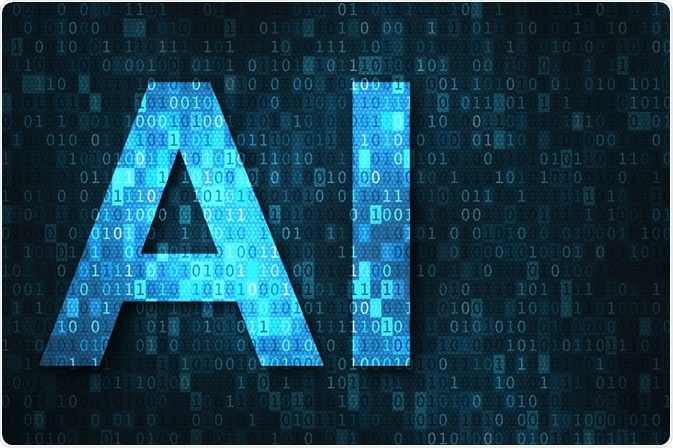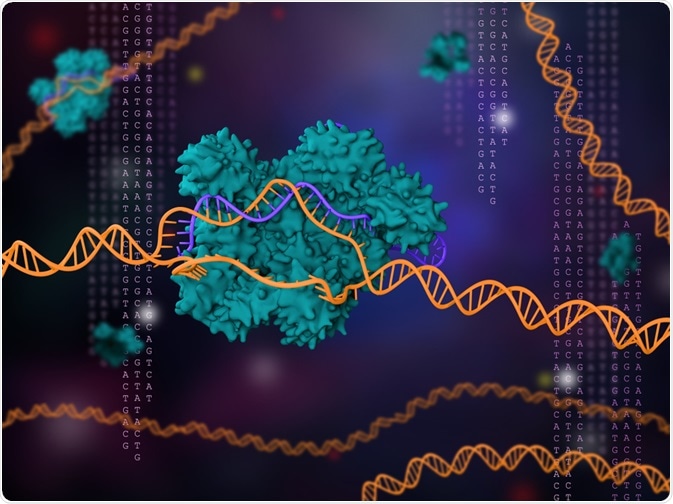The field of genomics generates vast amounts of complex data. The scale and complexity of this data makes converting it into useful and insightful information a critical challenge for scientists.
Artificial Intelligence (AI) and associated technological innovations can significantly improve the sorting, analysis, and interpretation of genomics data, reducing the time needed for data analysis and enhancing the efficiency of research.

Image Credit: NicoElNino/Shutterstock.com
What is AI?
AI is the simulation of intelligence in machines, allowing them to perform tasks that would ordinarily require human intellect. In genomics, AI relies on machine learning, where algorithms spot patterns or classify inputted data within the dataset, applying what the computer system has learned to new data.
Primitive forms of machine learning require more extensive training in classifying or recognizing data. But modern AI-based genomic approaches are now moving towards advanced machine learning algorithms, neural networks, and innovative AI technologies such as deep learning.
Deep learning mimics how the human brain picks out information. It is constructed using a series of multilayered artificial neural networks, often likened to the web of neurons in the brain.
This artificial neural network is a hierarchy of layers, where data comes in at each layer, which is then transformed into new information (known as a feature) by mathematical functions.
The multiple layers in a deep learning neural network enable unsupervised learning, allowing it to make its own predictions from large, unstructured, and unlabelled datasets without the need for human intervention.1
By circumventing the need for human intervention, deep learning vastly improves the capabilities of conventional machine learning systems, enabling fast, accurate pattern and relationship identification in large datasets.
This can be achieved at a tremendous scale, and deep learning's benefits have made it a key technology in modern genomics.
Data Mining Techniques in High-Throughput Genomics
How Can AI in Genomics Improve Medical Science?
By designing deep learning algorithms to compare genetic sequences, phenotypic outcomes can be predicted from genetic differences. By analyzing differences between sequenced genomes, deep-learning models can pick out diagnostic and drug targets and predict patient pathologies and prognoses.
Precision medicine is a rapidly evolving field in medical science, with advances in genomics playing a key role in providing new and innovative treatments for a wide range of medical ailments. Developing advanced machine learning and deep learning systems helps to improve big data analytics.2
The quantity of data and the generation of large quantities of electronic health records are crucial considerations in precision medicine. However, the quality of data and its accuracy and relevance are just as important for the advancement of machine learning in this field.
New analytical processes that go beyond mere data correlation will be essential for advancing the use of AI in precision medicine and personalized medicine.
Additionally, ethical considerations need to be addressed in this emerging medical field around the growing use of AI, but the approach of combining advanced AI and machine learning with physiological genomic data is highly promising.
There is also growing interest in using AI to provide pharmacological insight, such as finding the optimal drug doses for different patient groups.
By combining genomic data from patients along with drug mechanistic information, AI is being developed to understand the variability in drug response between different patients. Moreover, AI is improving the poor success rate in the drug discovery and development pipelines.
Download your PDF copy now!
Recent Advancements and Case Studies
Gene-editing technology, such as CRISPR-Cas9, may be used to modify DNA sequences and alleviate symptoms in diseases caused by genetic abnormalities. Among the ethical considerations of gene-editing technology, it is also limited by the accuracy and sensitivity of off-site target effects.
To combat this, deep learning systems have been designed, such as DeepCRISPR, which predicts on- and off-site sequence targets with high accuracy whilst predicting phenotypic effects from genetic alterations. As CRISPR technology is widely used in biological and medical research, improving accuracy through AI will have many applications.3
In precision medicine, AI has revolutionized the analysis integration of immunology data, genetic information, and patient health records.
Researchers can gain an unprecedented holistic understanding of potential risks and patient health, leading to better personalized health outcomes that go beyond traditional clinical capabilities.
Machine learning models have enhanced the diagnosis of conditions such as rheumatism and systemic lupus erythematosus (SLE) in recent years.
Extreme Gradient Boosting and Random Forest are two ML approaches in AI-driven genome analysis that have been used in recent studies to identify SLE patients, leading to better potential clinical outcomes for those patients.4
Several tools and platforms have been developed in recent years. Google’s DeepMind Health supports clinical decisions by utilizing AI to analyze electronic health records and medical images.
IBM Watson Health provides personalized medicine solutions by analyzing clinical notes to understand the context and meaning of both unstructured and structured data, helping clinicians better understand patient needs.

Image Credit: Meletios Verras/Shutterstock.com
Challenges and Ethical Considerations
AI is still largely an emerging technology, with new advancements in capabilities reported regularly in many fields.
However, while it has vast potential to revolutionize scientific fields such as genomics, some crucial challenges and ethical concerns must be addressed in both the AI and genomics fields.
One of the main challenges surrounding AI is its many associated data risks. Issues such as data tampering, data poisoning, data bias, and data integrity can present problems for researchers.
Data security and the potential for cyberattacks can also impact its use in many fields, requiring robust data security protocols and systems that protect data integrity.1
Data integrity and security are vital for genomics, as it generates large datasets of sensitive medical information.
Furthermore, ethics and safety must be prioritized, as there are potentially harmful risks of biased outcomes and privacy violations. Any AI system utilized in genomics must also comply with international regulations such as GDPR and be highly adaptable.
AI systems must also be transparent and accountable to help stakeholders such as users, and patients understand how they work and comprehend limitations and strengths. 1
AI's rapid progress and benefits must not come at the expense of patient privacy, ethics, data integrity, security, and confidence in its positive impact on genomics.
Top 5 Emerging Trends in Life Science and Biotech for 2025
Future Outlook
The applications of AI in genomics and AI-driven genome analysis in areas such as personalized medicine, precision medicine, drug discovery, and agriculture are varied and constantly evolving as new technologies and advancements are developed. This innovative field of computer science will only continue to impact genomics.
The market outlook for AI in genomics is good: by 2034, the total market value is predicted to reach $11.6 billion, a CAGR of 23.6% over the next decade (the market in 2025 is estimated to be $1.67 billion).
Increasing R&D and growing cross-industry collaboration are the two main factors that will influence this growth, according to some experts.5
However, whilst the benefits of this technology cannot be understated, key ethical considerations and challenges must be addressed by all stakeholders as the field continues to evolve and accelerate over the next few years.
References
- Stryker, C & Kavlakoglu, E (2025) What is artificial intelligence (AI)? [online] IBM. Available at: https://www.ibm.com/think/topics/artificial-intelligence (Accessed on 23 March 2025)
- Williams, A.M. et al. (2018) Artificial intelligence, physiological genomics, and precision medicine Physiological Genomics 50:4 pp. 237-243 [online] American Physiological Society. Available at: https://journals.physiology.org/doi/full/10.1152/physiolgenomics.00119.2017 (Accessed on 23 March 2025)
- Chuai, G et al. (2018) DeepCRISPR: optimized CRISPR guide RNA design by deep learning Genome Biology 19 Article No. 18 [online] BMC. Available at: https://genomebiology.biomedcentral.com/articles/10.1186/s13059-018-1459-4 (Accessed on 23 March 2025)
- Chen, Y-M et al. (2025) Unlocking precision medicine: clinical applications of integrating health records, genetics, and immunology through artificial intelligence Journal of Biomedical Science 32:16 [online] JBS. Available at: https://jbiomedsci.biomedcentral.com/articles/10.1186/s12929-024-01110 (Accessed on 23 March 2025)
- Towards Healthcare (2025) AI in Genomics Market Enhances Drug Discovery & Precision Medicine [online] Available at: https://www.towardshealthcare.com/insights/ai-in-genomics-market (Accessed on 23 March 2025)
Further Reading